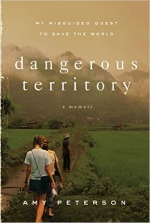 By Amy Peterson*
By Amy Peterson*
Reviewed by Elizabeth Jarrett Andrew
Discovery House, 2017, 224 pp.
The missions narrative, Peterson tells us early in her memoir, is supposed to proceed like this: an innocent or complicated childhood followed by a youth misspent or marked by holiness; a conversion, encounter, calling; a “commitment to go, against all odds.” Once overseas, difficulties are always overcome by faith and prayer. Peterson traces this narrative’s roots to Jonathan Edward’s Life of David Brainerd, a romanticized biography of an ineffectual missionary who tried to evangelize Native Americans. The story is much like the myth of the American frontier hero—“a rugged individual off to conquer a new frontier for the good of a community.”
Dangerous Territory veers widely from this form. After college, Peterson heads to southeast Asia to serve God by teaching English, with implicit hopes of getting converts. We know from the start that she makes a mess of things. She can’t name the country without endangering the freedom of former students. Her youthful good intentions are born of forces much larger than she initially sees—a long history of Christian missions, a theology that presumes superiority to other faiths, a patriarchal church that both endorses and limits the leadership of women—as well as her adventurous spirit and genuine love for bridging difference.
While the story of Peterson’s botched work is a bit disappointing, mostly because an intolerant, autocratic government restricts her from re-entering the country, her journey through the morass of motivations for contemporary mission work is well worthwhile. She traces her mission experience back to early European evangelism, in which Catholic missionary orders were closely associated with political colonization, and then later to American Protestant missions’ intermingling with corporate-style capitalism. She gives a biting critique of short-term missions’ self-serving and self-congratulatory work, posing instead that short-term trips ought to be made for the purpose of listening, conversing, and building relationships.
When her home church reacts strongly to her preaching, she digs into the history and consequences of women in missions.
What was a female missionary to do? She could preach the gospel in evangelism, but once a church was formed, she was forbidden from preaching in the church pulpit. She could teach men about the scriptures in small groups…but not as a head pastor of a church? And wasn’t there something ethnocentric—even racist—in the American church’s willingness to send female missionaries to preach and teach in foreign countries while refusing to let women preach or teach white American men?
In the end, she advocates retiring the word “missionary” entirely in favor of new ways of talking about God’s work in the world—ways that are inclusive of a wide range of means. The point is to put “love where love is not.”
Underneath her struggles with missions, Peterson’s memoir is essentially a journey from a faith where God’s grace must be earned with good works to a deeper faith in God’s grace, given regardless. “I had long been the girl with the answers… But living cross-culturally had made me question all my assumptions. … I became a person with questions. Instead of colonizing, I worked to cooperate.”
As humbling as it was to get into trouble with a foreign government, Peterson’s consequent spiritual emptiness provides the transforming fire. “Letting go of my ownership of the language of faith meant recognizing that I could only speak it as a second, and learned, language. The words of faith didn’t belong to me, or to anyone but God.”
Hers is a journey into deep spiritual listening—one we’d all benefit from taking.
*Amy Peterson was a participant in the 2014 Deepening Words: Writing and the Spiritual Life—A Week with Lauren Winner workshop at the Collegeville Institute, where she received feedback on the first chapter of this book.
Like this post? Subscribe to have new posts sent to you by email the same day they are posted.



Thank you for putting this out there. I agree with your opinion and I hope more people would come to agree with this as well.